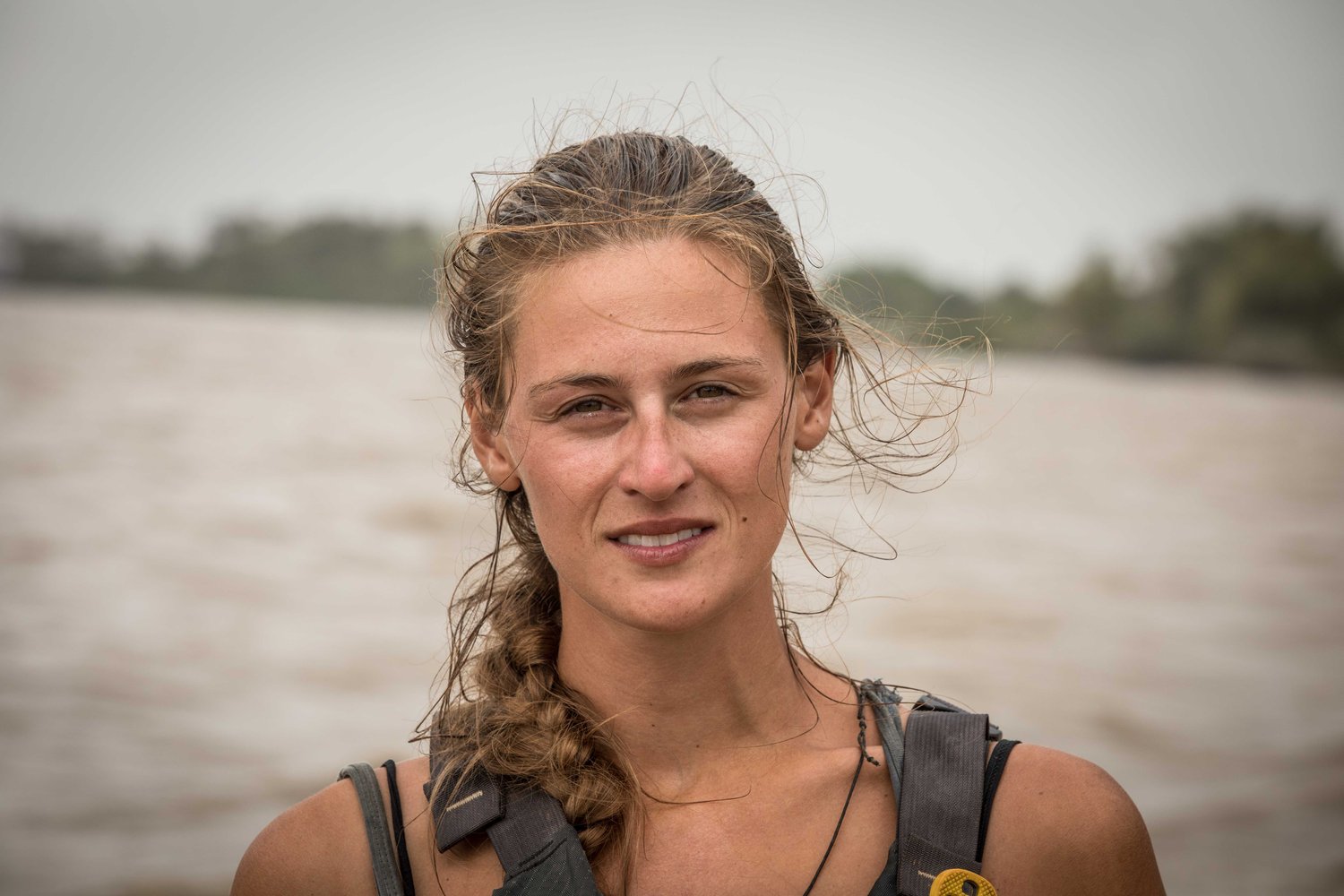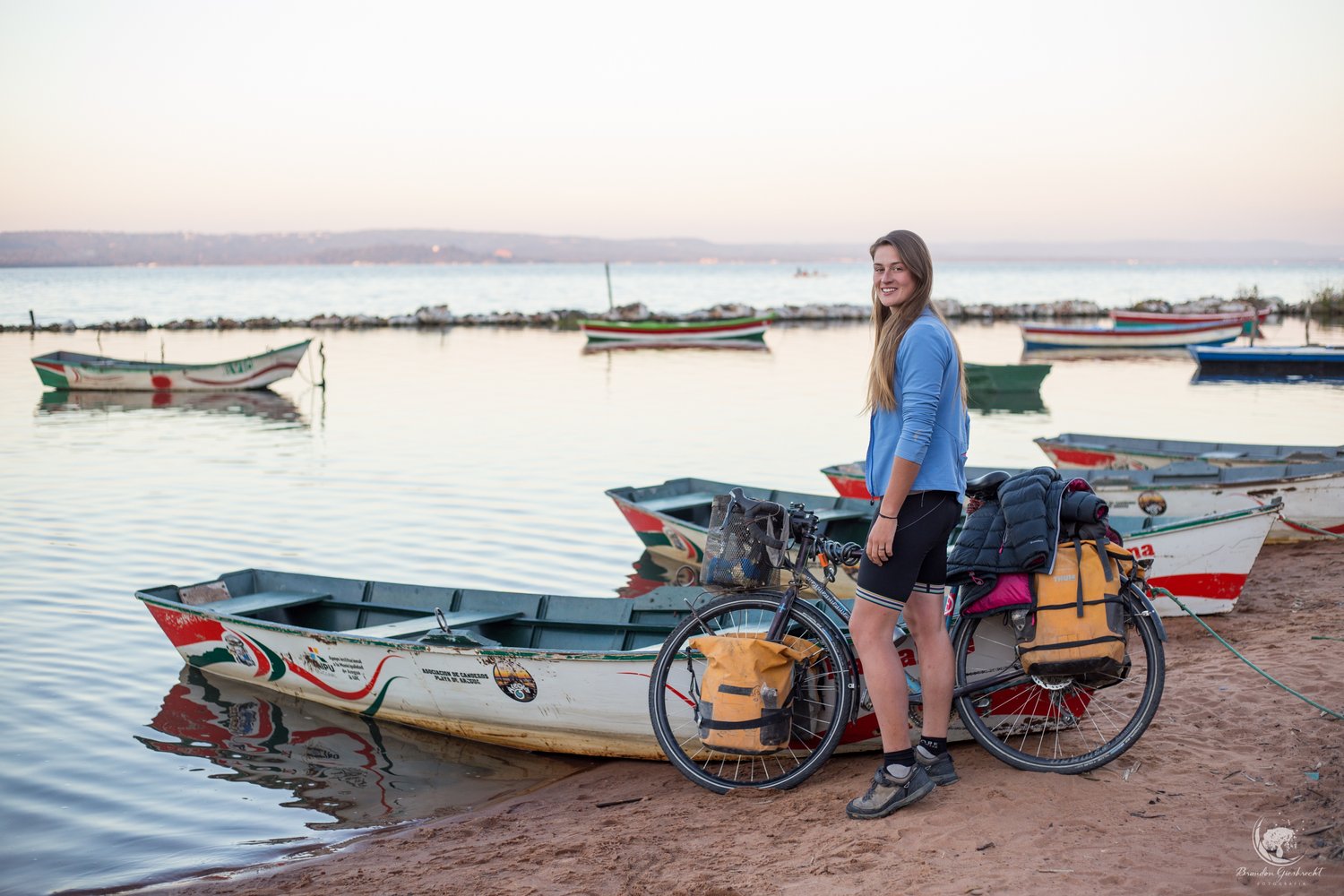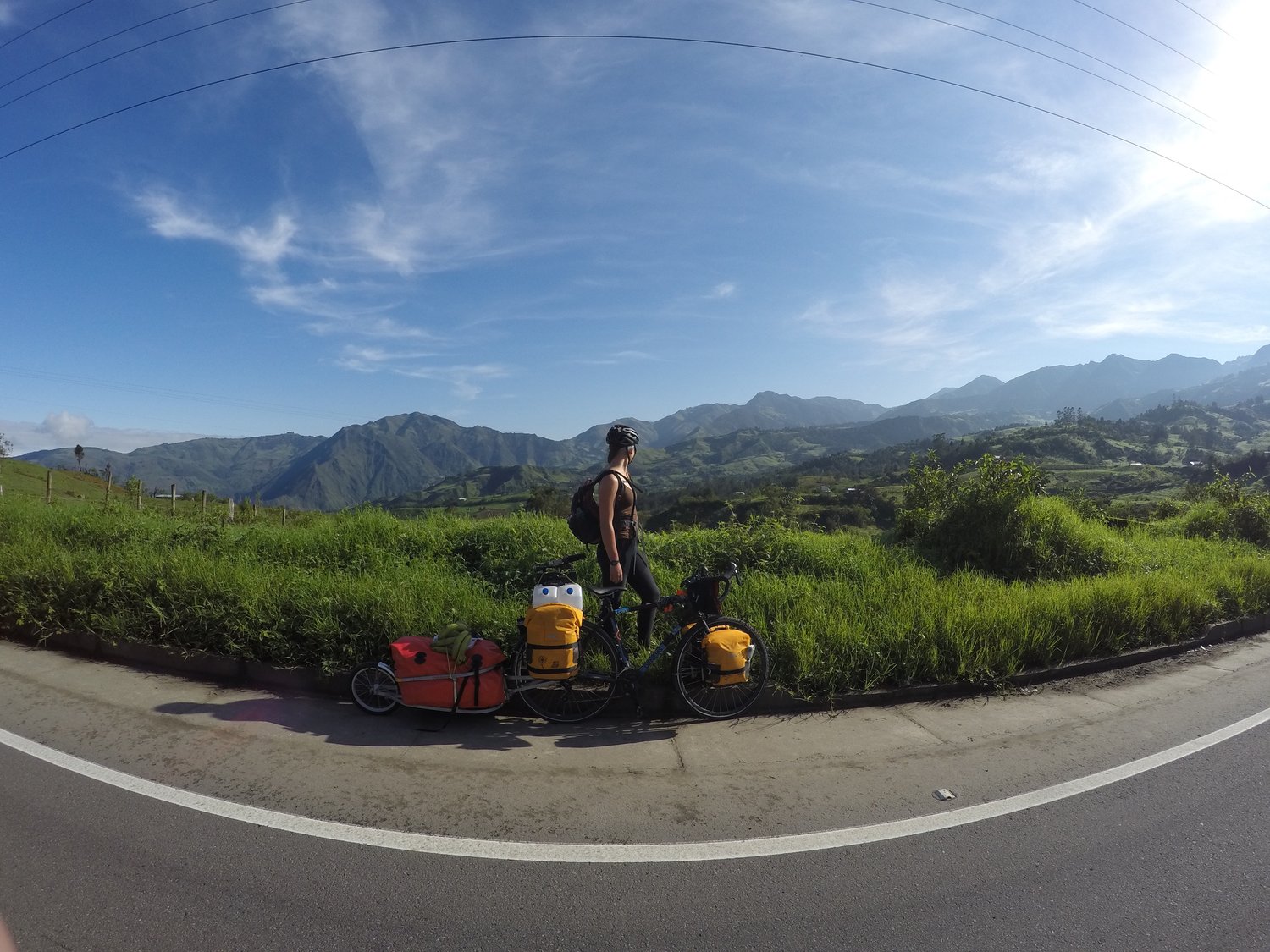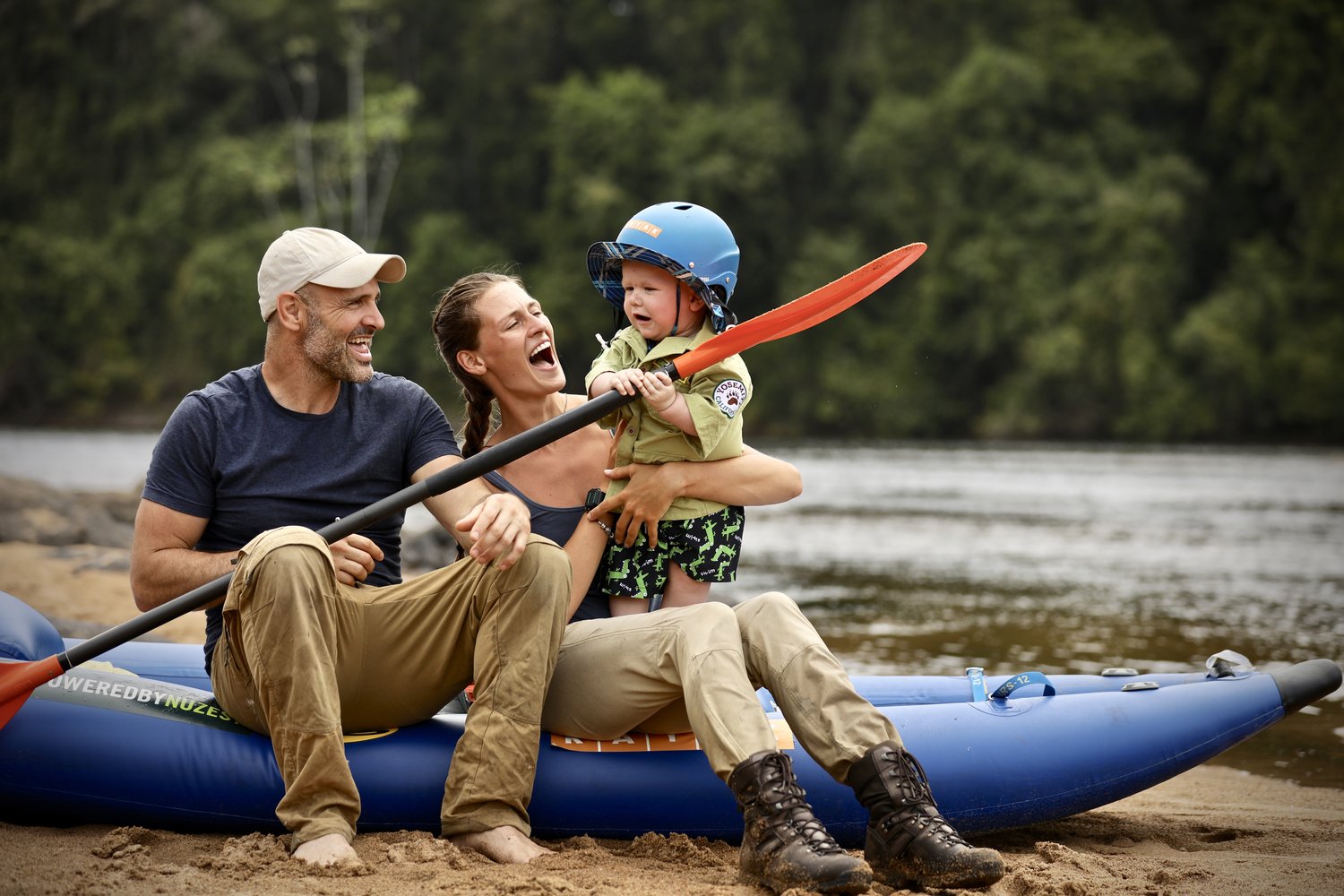Your Cart is Empty
Extra 10% Off Sale Items - Discount applied in basket
Extra 10% Off Sale Items - Discount applied in basket
Extra 10% Off Sale Items - Discount applied in basket
Extra 10% Off Sale Items - Discount applied in basket
September 09, 2022 12 min read
Laura Bingham is a natural-born adventurer, author, and explorer who left home in her teenage years to explore what the world has to offer. Amongst many other remarkable expeditions, Laura has sailed across the Atlantic Ocean, cycled across South America with no money, and most recently successfully led the world’s first expedition to locate the source of the Essequibo River in Guyana. Laura is married to follow survivalist and adventurer Ed Stafford. We caught up with Laura to find out more about her extraordinary expeditions, and it was clear that determination and resiliency are close to her heart. She’s keen to instil this in the young readers of her illustrated children’s books: ‘One Girl and her Bicycle.’. As Laura stated; “Perseverance is the difference between those who make it and those who don't.”

Laura Bingham
Thank you for joining us, Laura! Could you tell us a little bit about your background? How would your friends/family describe you?
Yes, sure! I started adventuring because of trauma, I was quite troubled as a 16/17-year-old, and then found really negative coping mechanisms. I then decided to try and go travelling and find healthier coping mechanisms. That’s how I started travelling, and then they just got bigger and bolder until I found myself doing a wild first expedition to locate the source of the Essequibo.
My friends and family would describe me as moral, in the sense that I really don't like stealing or lying, and that kind of stuff. So I'm quite true to my word, and I hate disappointing people, and I hate letting people down. For example, once I said I'd give a free talk for a cycling brand, and I had DV the night before, so I was throwing up but I was like, no, I said I'm going to do it so I’m still going to go do it. My husband was like, they'll understand if you can't go and do it but I insisted on still doing it. So I literally gave a talk with a bucket next to me on stage. I now think maybe that was immoral because I could have given it to other people, but I didn't want to let them down. If I say I'm going to do something, I'm going to do it. But yeah, definitely I like to be a rock. I might not always be there every day, but I'll be there when it matters. I would also say I’m a little bit fruit loopy, I like to have fun. There's no point in life if you're going to take it seriously all the time. Just dance like no one's watching!
You’ve achieved a ‘world-first’ and been on many incredible expeditions. When did you first find your love of the outdoors?
When I was like really, really young, I definitely preferred TV to the outdoors, like most children. But then my parents took me white-water rafting when we went to South Africa and like micro lighting. So I definitely got a taste of adventure there, but I’d say my real love for expeditions and the outdoors grew when I was in Mexico. We went hiking up loads of mountains and went to all these hot springs and natural pools, and it was just so beautiful. And then when I sailed the Atlantic from Orlando back to the UK, that just kind of sparked the expedition side of me rather than just the travelling and outdoorsy side of me.


That leads me quite nicely to my next question! In 2014 you decided to embark on a two-month sail across the Atlantic Ocean, with zero experience. What inspired you to undertake this mammoth challenge?
Lack of money. My family and I have never been that wealthy, there was never oodles of money. I found myself in Mexico running out of money, and you’re only allowed to be there for four months. It was coming up to that four-month point, and I didn't have enough money for a flight back home. So I was like, how am I going to get back home? How am I going to get back to the UK? So I was thinking maybe I could go on a cargo ship, but then I realised it cost about £2000 pounds and would take two weeks. I didn’t have enough money for a single flight from Mexico to England, so I definitely didn’t have enough for a £2000 cargo journey. I then spent about three or four hours searching the internet for different ways of travelling, and I landed on a site called Crewbay, which was really reputable and had really good reviews. It's just a website that advertises voyages, where people need crew or crew need voyages type thing. I found one from Orlando to the UK, so I then got a cheap flight from Mexico to Orlando, and then jumped on this ship with two guys and a cat that I'd never met before, which in hindsight was probably quite stupid because they could have been dangerous!

How long did that voyage take you?
Just short of two months. We were stuck on the Azores for about a week and a bit because the winds weren’t right to set sail, which is amazing because we were there during this festival. Every Sunday in June or July they have this festival where they feed everyone in the streets. So one family was elected the previous year to buy a cow and use that cow to feed everyone in that town. They also hand out free milk and free bread. There’s this whole tradition is the kings and crowns and the legend or whatever it is is that they bury the crown, and the crown would only show itself to the best king. So one king decided to put on a festival-type thing to feed his people to show him how generous he was. Then the next Sunday is another family and they try and prove how generous they are.
That doesn't sound like the worst place to get stuck! You also attempted to cross the entire continent of South America completely human-powered and with no money in 2016 which is an absolutely incredible feat! It was great to hear you were raising money and awareness for Operation South America, a charity that looks after homeless or abused girls and young women in Paraguay. Could you tell us a little bit more about this adventure?
Yes, so the only reason that I decided to cycle was that it was quicker than walking. I realised that I could walk up the hills and then speed down. I also realised that every Tom Dick and Harry has cycled South America so I was looking for a way to make it different and to make it more individual. So as I was scrolling on the internet, I found this organisation called Operation South America, they're a Christian group and they're such lovely people. I thought that their intentions and their message were so lovely so I got really friendly with them and I just felt really passionately about all the stories that they told me. For example, there was one set of girls that came to them and they didn't know that they were supposed to eat every day, they thought that they were just supposed to eat every other day because their mother had died when they were young, and their father had to go off to work and he could only come back every other day. The kids were seven and five years old. They didn’t know that you’re supposed to eat three meals a day, they just ate every other day when their father came back from work. They were left for 24 hours at a time. It’s only really when you hear those kinds of stories that you realise how lucky we are because if we can't feed ourselves, we can go to our parents, and then our parents can kind of feed us or give us a bit of money. If our parents aren't in that position, then the government can give us Universal Credit. And then if the government can't really give us Universal Credit, there are food banks, and there are so many safety nets or layers in the UK that just mean we very rarely go genuinely hungry. And if we do it’s because we've not explored all the options, I guess. But in South America and a lot of other countries, it's not set up that way.
For example, when we were in South America, Ed, my husband, got hit by an articulated lorry. Some people stopped and I was asking them to call an ambulance and they had no idea what I meant, it’s not something they’d typically do. So someone told us there’s a health centre down the road, so we had to shove Ed in the back of a pick-up truck, took him down a really, really bumpy road, bearing in mind he had just been hit by a lorry, he was so pale. We didn’t know the extent of his injuries at this point, he could’ve had spinal damage and there he was in the back of a pick-up truck going over really bumpy roads. We got to the health centre and there was just a number to call, someone turned up 10 minutes later and stabbed him in the bum with a syringe. We had no idea what was inside that syringe. In the UK there are so many procedures when accidents happen, and we’re so used to seeing things sealed and the doctors have our medical records but it was not like that there. I wasn’t supposed to be using any money on that trip, however, the doctor asked for cash before they’d do any sort of procedures so I had to run all over the place to try and find a cash machine. Thankfully everything turned out to be fine but it really does just show how lucky and privileged we are here in the UK.


You faced many obstacles when doing this expedition, such as having to rummage through bins for food and eating leftover scraps from restaurant customers’ plates. This must’ve been so tough. How did you find the motivation to continue?
It sounds kind of petty but I just hate that moment if you’ve stopped doing something and you come back home and people very compassionately go; “oh it’s okay, at least you tried.” And I’m like I don’t want to just try, I want to complete it. I just don’t give up, I don't know whether it's stupidity or just pure perseverance. It just feels like stubbornness, almost. I just can’t take no for an answer, even to the point where just now I went to a furniture store and the guy was like “you’re never going to get all that in your car” and I managed to fit it all in the car and prove him wrong. I just don’t give up on anything. Although in saying that, cheating is one thing I don’t mind doing if it means I’m going to win. For example, in CrossFit, I always do the number of reps that I'm supposed to do even if I have to catch up at the end of the class if I can't keep up. If it’s in terms of a race where I know I’m going to lose, I’m very happy to tie someone’s shoes together!
I also find that if you put yourself in a situation where you physically can't give up, so when you're up a mountain, and there's no one around you, you can't give up. Similar to when I was in the Essequibo river, you can’t really give up if you’re in the middle of a jungle. You just have to try to push yourself to keep going, even if crying every day helps get you through it!
Another one of your incredible endeavours was in 2018 when you successfully lead a world-first expedition to locate the source of the Essequibo River in Guyana, then make a decent by kayak. What were the main objectives of this expedition?
So the cycling expedition was more of a humanitarian charity led to publicise how hard it is for people in South America and about this organisation. I don’t know if you know about my children’s books, they’re called ‘One Girl and Her Bicycle’, they’re all about that cycling expedition. In book three called ‘Lands of Courage’ that has the organisation in there which is really nice and all profits go to them.
The aim of the Essequibo expedition was more personal. It was to highlight deforestation and mining and showcase Guyana, the rich culture and the ecotourism. It was also an arrogant ‘this is what humans are capable of’ to try and find the source and do a world’s first. The river had never been traversed before.


What sort of wildlife Did you see when you were there?
We saw a LOT of Jaguars. When Ed walked the Amazon, he didn’t see any Jaguars, but then in Guyana, it’s one of the only countries where you’re allowed to cull Jaguars because their numbers are so prolific. If the indigenous communities see sort of 5 Jaguars in a week, they’re allowed to start culling a few because they’re just so rife out there. Everyone I spoke to had their dogs stolen by Jaguar. I remember saying to someone “you’re so lucky you don’t have foxes because the foxes always kill my chickens”, and she was like “well we do have Jaguars that steal our dogs!” We had a Jaguar that ran through our camp one night. I didn't wake up. Everyone else woke up and chased it off. I was asleep to the whole thing, which is stupid. And we heard them calling every night. We saw Howler Monkeys, I remember going to the loo and looking up and there's just a monkey staring at me from the top of the tree. It’s like Disney there, there are animals everywhere. There were birds with really beautiful colours. It’s almost Jurassic over there. The jungle is so rich, honestly, if a dinosaur walked out, I wouldn't have been surprised. There was one area with rocks stacked on top of each other and loads of grass growing out the top of it, it looked like one of those tepee things.

Have you ever come close to abandoning an expedition?
Yes, I almost abandoned the Essequibo expedition. My husband and I always agreed that one of us would be at home with our kids, that was the stipulation. If I went away, he'd stay at home. If he went away, I’d stay at home. Our expedition ran over and Discovery Channel was not amicable, and they wouldn't put back their shoot for Ed. This meant that my son was in the country without a parent for three weeks. And I was like, you can't be without a parent for three weeks. Everyone was saying to me it’s only three weeks and he’ll be so proud of you after you’ve done this two-three month expedition, you can’t give up and I was like yes but he’s my child I can’t just leave him. Thankfully he has a really close relationship with his grandmother. I didn't really know what the right thing was to do or whether I did the right thing or not. You don’t know how things are going to affect your child until much later. But he was a very, very, very happy baby, he is a very, very happy boy.


Who is your biggest inspiration?
My husband. All of the expeditions that he has done have been hugely inspiring, but also he is massively supportive and massively motivates me to keep going and striving to do better things. He’s my biggest cheerleader and he inspires me the most because of all the things that he does and all the things that he says.
What’s the one piece of advice you have for somebody wanting to take on their first big adventure?
I think you can always find an excuse as to why you can't do it, whether it's to do with money or obligations. I think if you really want to do it, just do it. Stop using excuses about the timing not being right, or the finances not being right and just do it. If you need to get sponsors on board, you need to make a sponsorship document. That’s usually a PowerPoint with lots of pretty pictures, sponsors love pretty pictures. If it’s an A4 typed document they won’t even look at it because it’s boring. They have so many to look through. Use as few words as possible, and take some really great photos if you want to professionalise travelling. In terms of anyone just wanting to go and do anything, just stop making excuses.
I'm definitely guilty of that! My final question is, do you have any more big adventures on the cards?
We are moving country next April, but have not announced where yet. We’re ready for a new adventure, we’re bored of the UK and being in the same kitchen! I’m trying to teach the kids Spanish and they’re just not learning Spanish, so I thought if we moved to a Spanish-speaking country, then they've got no choice. There are loads of different expeditions that I want to do. I did the Essequibo because I was scared of losing who I was when I became a mother, but then after I had the girls, I was scared of losing their childhood and not spending that time with them because I can’t get it back. I decided I would focus on them and their childhood whilst they’re really small because I won’t get that time back again whereas I can do expeditions at any point in my life. I’ve been focussing on them for a few years and making sure we make some really good memories as a family and then I’ll get back to expeditions.

Laura, Ed, and their son Ran in South America. Credit: Jon Williams.
Thank you so much Laura for taking the time to chat to us! You can read more about Laura on her website and stay up to date with her expeditions on her Instagram.
Comments will be approved before showing up.
